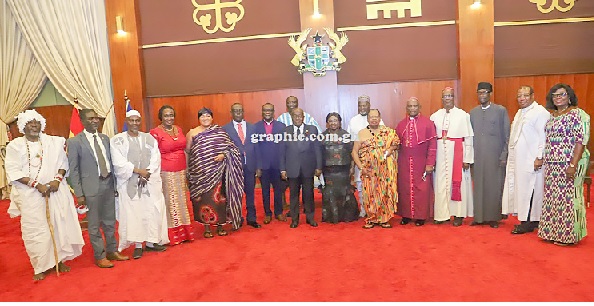
Religion, elections and political tensions (Part 2)
Ghana has enjoyed harmonious inter-faith relations since its independence in 1957.
Today, most Ghanaians are very keen to preserve inter-religious harmony. Dangers of religious disharmony may increase at election times and the resulting political instability would be bad news for everyone.
Consequently, everything must be done as December 7 approaches to minimise the chances that religious differences will increase political instability and conflict.
In this election year, many religious leaders – including those belonging to the majority Christian and minority Muslim faiths – are making frequent public pleas for religious harmony, urging their followers, as well as politicians not to fan the flames of political instability and increase tensions.
These appeals are very important and it is hoped that those thinking about trying to increase religious tensions take heed and desist from their malicious activities.
Several potential sources of political instability linked to religion can be mentioned. First, there is the threat of jihadism emanating from outside Ghana.
Islamist militants from, for example, Burkina Faso, Mali and Chad are said to be targeting disaffected Muslim youth to involve them in their terrorist campaigns. This threat is being closely monitored by the security services. Religious leaders must do all they can to ensure that disaffected youth do not fall to the wiles of jihadists.
Second, Ghana has serious wealth disparities, which are to an extent linked to religion. Some living in the relatively poor and underdeveloped north of the country, where many of Ghana’s Muslims live, may feel they are missing out on development gains. Some may believe that southern Christians are benefitting most from Ghana’s current development policies.
To address these concerns, the government should redouble its efforts to ensure that the more impoverished parts of the country see development benefits.
Third, there is the issue of what some see as skewed political power. Christians, many of whom were from the south of the country, have dominated politics and played leading roles in government since independence. Some Muslims would like to see this perceived imbalance corrected.
Some Christians may not feel that it is time for a change and may seek to resist such efforts. The two front runners for the presidency, Dr Mahamudu Bawumia and John Dramani Mahama, are both from the north and this is a good opportunity to reverse this disparity.
Religious harmony
With such concerns in mind as the election approaches, efforts are being made to ensure that potential religious tensions do not boil over into serious political conflicts. The National Peace Council (NPC), mainly comprising senior Christian and Muslim figures, is working hard to ensure that the election remains peaceful.
However, the NPC is currently working to resolve around 300 conflict situations across the country, including chieftaincy, land, ethnic and religious conflicts, and it can only do so much on its own in trying to resolve them all.
The NPC has allies at the local level. There are many examples of community leaders seeking to educate their communities on the benefits of religious harmony, tolerance and peace. The most obvious benefit of this course of action is that people can get on with living and improving their lives without diverting precious energies into communal conflicts.
The NPC sees a major threat to religious harmony in the pre-election period emanating from the ambitions and activities of some politicians who aspire to be elected to positions of political power.
The NPC has recently threatened to name and shame those politicians and electoral candidates who, the NPC believes, are seeking to exploit religion for political gains. The wider point is that some political parties and their candidates are seeking to exploit what they claim are politically relevant religious differences in their pursuit of votes and enhance their chances of getting elected on December 7.
This concern highlights that some candidates are actively seeking to exploit societal concerns, concentrating on real or imagined religious rivalries and disharmony, in their bid to win votes.
Many African countries have political conflicts which draw on real or imagined religious differences.
Ghana is a religiously plural West African country with an enviable record of religious harmony. Some of Ghana’s neighbours have not been so fortunate and the stakes for Ghana are high as the elections approach and religious issues emerge which may increase political instability.
Religious differences do not have to be associated with conflict and religion can play a significant role in attempts to resolve inter- and intra-group clashes, diminish conflict and help build lasting and durable peace.
Religious leaders are uniquely positioned to foster nonviolent, inter-faith and intra-faith conflict transformation through building constructive, collaborative relationships with peers.
Ghana has long been a role model for African democrats and it is to be hoped that the country’s well-deserved reputation for religious harmony and peace continues during this election year. As noted earlier, the stakes are high.
The writer is an Emeritus Professor of Politics, London Metropolitan University, UK
UK; tsjhayn1@londonmet.ac.uk
